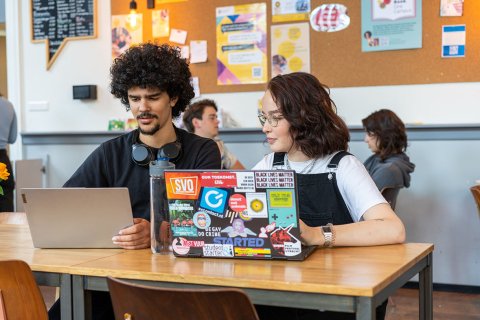Study programme
The Master's programme International Relations in Historical Perspective comprises one year (60 EC). A study year is divided into two semesters, running from September until January and from February until June. A semester is divided into two study periods.
Curriculum
The programme consists of compulsory courses, research seminars, electives, and is concluded with a practical of a research track. Check the study schedule (PDF).
Semester 1 | Study periods 1 & 2
During the first semester, you will take a combination of team-taught compulsory courses, research seminars and elective courses:
- The Modern World and the State System: Historical and International Relations Theories. This core (compulsory) course provides a historical and theoretical analysis of key concepts and approaches in international relations and international political theory
- IR in Practice: This core (compulsory) course provides students with the opportunity to learn to find, identify, analyse and also draft key documents such as policy briefs and UN resolutions.
- Research Seminars: Aiming to foster the students’ critical and analytical skills through researching and writing a proposal for further research, research seminars cover three broad themes: Conflict and Security, Europe and the World, Globalization and Global Governance.
- Electives offer you the opportunity to specialise in two additional research areas. You can choose from among three themes, which focus on ’Security and Conflict’, ‘Europe and the World’, or ‘Globalization and Global Governance’, and which match the three research pillars of the History of International Relations team. Each theme is in turn subdivided into two case-studies, which can vary on a yearly basis, such as terrorism, Spain in a European context, and the Middle Eastern Conflict.
Semester 2 | Study periods 3 & 4
In the second half of the year you can choose one of three programme tracks, according to your interests:
- Practice track: You will undertake an internship (15 EC) and write a thesis (15 EC), in the order of your choice.
- Research track: You will take a research tutorial (10 EC), and will write a longer research thesis (20 EC).
- Applied Research track: You will be enrolled in one of our Labs (15 EC), for example, Ter Info: Discussing Terrorism in the Classroom, which offer internships that are run in collaboration between the History of International Relations group and external partners, and you will write a thesis (15 EC).
We will ask you to communicate your choice to us (Practice Track, Research Track or Applied Research Track) by January, during our yearly mid-term evaluation talks.
Examples of MA theses
- The Emergence of Pan European Movements in Today’s Europe
- YEMEN: A Forgotten Responsibility? An Analysis of the Implementation of the R2P Principle in the Yemen Crisis
- Of Power and Influence Henry Deterding, Royal Dutch Shell's Unofficial Diplomat (1912-1922)
- Moving fast and breaking things? Facebook's Lobbying of the European Union's General Data Protection Directive
- Rape as a weapon of war: the motivations of terrorist group Boko Haram for using rape as a strategy in Nigeria, 2009-2018

Educational methods
- seminar: 50%
- internship: 25%
- independent study: 15% (thesis)
- group work: 10%
Writing a thesis at the end of your studies is an individual exercise, but you will write it in the context of a coaching group that regularly meets under the guidance of a supervisor. Your supervisor will also be available for individual coaching.
Internship
An internship offers you the opportunity to test your knowledge and skills in practice. An internship at organisations like the EU, the UN, or the Foreign Ministry seem the most obvious options, but there are many more interesting opportunities, ranging from the policy-making sector to journalism, think tanks, NGOs and international companies. You will also have the opportunity to conduct an internship within a larger project based at Utrecht University, for example Ter Info: Discussing Terrorism in the Classroom.
Most organisations in the Netherlands use Dutch as their working language. Keep in mind that you can also do an internship within an international organisation in the Netherlands or abroad, or while supporting a research project based at our university.
Examinations
- essay exam, usually in the shape of a take-home exam
- papers
- presentations
- role play
Extra opportunities
For students looking for an extra challenge in addition to their Master's, there are several options. Utrecht University offers several honours programmes for students looking for an extra challenge. Honours education is followed on top of your regular Master's programme and goes beyond the regular curriculum. Honours programmes are available at interdisciplinary level and allow you to work on projects that transcend your own discipline.

